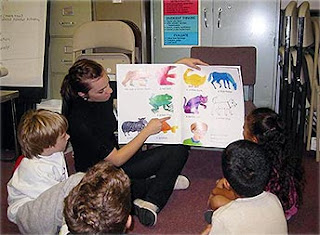public institution in California and educates much of the best talent in the LAUSD system, the university is cast in a unique and pressing role to produce teachers who will act as change agents in improving the performance of economically disadvantaged neighborhood schools.
 The College of Humanities’ Liberal Studies Program seeks to increase literacy rates city- and county-wide through its Literacy Scholars for the future of Los Angeles (LSLA) initiative, which in January received a $10,000 grant from the Mara Breech Foundation for the 2012/13 academic year.
The College of Humanities’ Liberal Studies Program seeks to increase literacy rates city- and county-wide through its Literacy Scholars for the future of Los Angeles (LSLA) initiative, which in January received a $10,000 grant from the Mara Breech Foundation for the 2012/13 academic year.Southern California philanthropist Mara Breech, who died in 2004, created her namesake foundation in 1994 to “promote and encourage innovative and creative methods of teaching.” This is the organization’s second consecutive year of collaborative sponsorship for LSLA.
LSLA, now hosting its fifth cohort, is a specialized concentration wherein Liberal Studies students pursuing Pre-credential B.A.s study best practices in early literacy and language acquisition and apply their learning with children from diverse backgrounds and their families, not only in classrooms but also in real-world settings such as community centers, after-school programs, and families’ homes. In this way, LSLA students work within the socioeconomic contexts of target children to identify potential learning challenges and strategies.
Part of LSLA’s innovation lies in its interdisciplinary nature, with courses taught by English and Linguistics/TESL (Teaching English as a Second Language) professor Sharon Klein, Special Education professor Sue Sears, and Chicana/Chicano Studies professor Rosa Furumoto. Presenting wide-ranging considerations and perspectives on outcome-based, student-centered teaching strategies, these educators assist LSLA students in developing the “literacy portfolios” they will access throughout the program and in their own future teaching careers.
LSLA candidates must meet selective eligibility requirements and must demonstrate strong motivation to serve in high-need schools. Cohort members receive a stipend to assist with educational expenses and receive all necessary textbooks for the three-course program free of charge. Reading materials for children and their families are also provided, in English and Spanish, through grant funds.
Vital to the development of children’s literacy is the understanding and engagement of parents, who are included in the learning experience. Among the program’s signature goals is exploring and addressing needs specific to recently immigrated Mexican families. Past family participants—for whom the program is entirely voluntary—report not only an improvement in their children’s reading interest and abilities, but an increase in their own level of engagement with both English and Spanish language arts education. Says one parent of her experience, “I learned the importance of speaking two languages, and the importance of not losing one’s primary language.”
The Mara Breech Foundation’s generous ongoing support of LSLA improves L.A. public school education at the root level, ensuring that tomorrow’s young teachers fully understand the positive impact they can have on their students’ lives and providing them with essential tools to maximize that impact. “The fact that one adult who really cares and listens to a child can actually change them for their lifetime and grant them hope and the perseverance necessary to do things like stay in school is a realization that I can never forget,” says one former LSLA student. “Using this increased knowledge, I am now conscious of how important it is to be present for all of my students and treat each one with respect, dignity, and equality.”